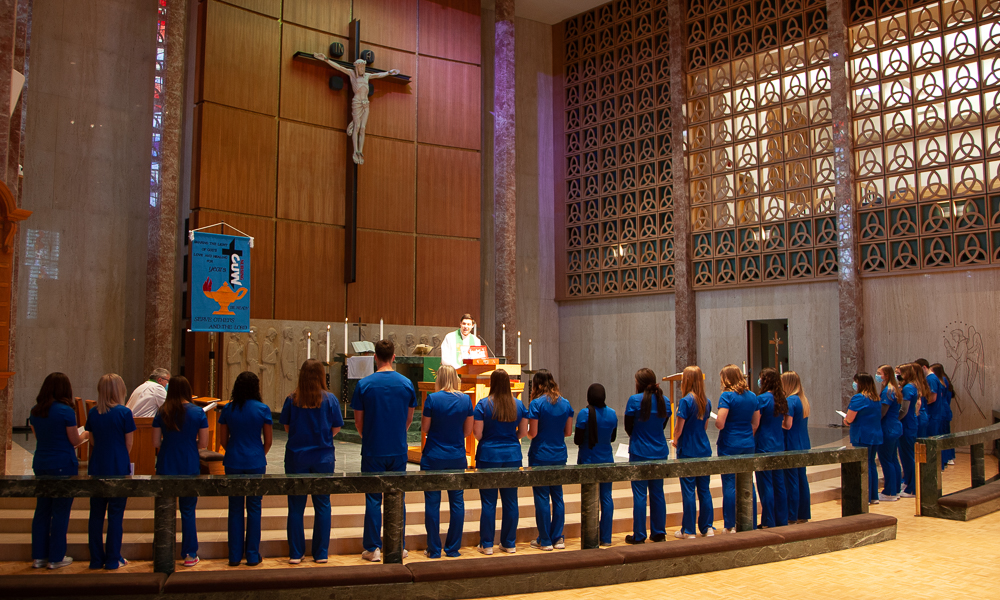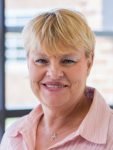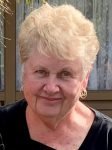 Associate Campus Pastor Doug Bender addresses Nursing students at the spring semester dedication ceremony in the Chapel of Christ Triumphant.
Associate Campus Pastor Doug Bender addresses Nursing students at the spring semester dedication ceremony in the Chapel of Christ Triumphant. Concordia University Wisconsin’s School of Nursing turns 40 this year, making National Nurses Week an extra special cause for celebration in 2022.
In honor of National Nurses Week (May 6-12) and the 40th anniversary of Nursing at Concordia University Wisconsin, we asked two CUW Nursing veterans to share some thoughts on its past, present, and future.
Dr. Carol Lueders Bolwerk: Program Director—Parish Nurse and Congregational Ministry; Professor (1987-present)
Dr. Grace Peterson: Professor Emeritus (1990-2015), former Chair of the Nursing Department
What can you tell us about the origins of the Nursing program at CUW?

Carol Lueders Bolwerk: It started with the Rev. Dr. John Buuck, the school president at the time, who really had a vision. Concordia was still down at the old Milwaukee campus, and in a bit of a crisis. We were down to about 500 students. So they bought this campus in Mequon, and hired a lady named Dr. Marge Viehl, who was LCMS, to develop a nursing program. Pastor Buuck really felt that Concordia should develop the callings of health care professions. Based on his background as both a minister and a biologist, he felt that nursing was a calling, a vocation. That was the beginning, in 1982. Then our first graduating class was in 1986. Can you add to that, Grace?

Grace Peterson: One thing I remember is that after I took over from you as department chair, when I filed my first report in 1994, there were 112 students in the undergraduate program, the LPN, and the BSN completion program. When I stepped down as chair in 2007, we had over 700. So it really grew!
School of Nursing Timeline
- 1982: First nursing class admitted
- 1986: First class graduated
- 1987: Nursing program approved by the National League of Nursing
- 1989: Parish Nurse Program started
- 1989: BSN Completion program started
- 1995: Master’s in Nursing with emphasis on Nurse Practitioner
- 2000: Nurse Educator program begins
- 2005: First Nursing mission trip
- 2008: First Doctor of Nursing Practice program
- 2012: Nursing Department becomes School of Nursing
- 2014: Nursing enrollment hits all-time high of 1,357 students (555 undergrad/BSNc, 802 grad)
What is Parish Nursing and what is its place in the School of Nursing?
CLB: It’s a very good mission fit in regard to serving people in mind, body and spirit. Parish Nursing is a specialty, recognized by the American Nursing Association, that focuses on the intentional care of the spirit. Since 1989, we have offered Parish Nursing—or another term is “faith community nursing”—to over 4,000 registered nurses, some clergy, some social workers and other healthcare providers, to equip them with resources and information to establish a congregational health ministry. We have an annual conference, which I think is probably the longest-running conference at CUW. Our 30th annual conference will be in two weeks, with the theme “Praise God from whom all blessings flow.”
Is faith integration something that distinguishes CUW Nursing?
CLB: Oh, absolutely!
What are some other ways that happens?
CLB: For instance, we have a course that developed from Parish Nursing called “Christian Caregiving.” We expose our students to the specialty of nursing, but also how to serve others and their patients and families in mind, body and spirit. It’s a really good course because I get to teach it with the Rev. Dr. Dan Paavola. So it’s a partnership between theology and nursing, and we offer it as a three credit course. It’s just a two-week course, but it’s very intensive. We also offer this course in summer as a four-day intensive course. We also have students from many other programs taking this course, so it’s very interdisciplinary.
GP: Another way faith is integrated is through the mission trips with nursing students. That’s another legacy of Dr. Buuck, who encouraged me to lead those trips, starting in 1995. We’ve regularly gone to places like Mexico, Costa Rica, and Belize, places where there was really a need for both the Gospel and better medical care.
CLB: Those mission trips that Grace started have continued to this day, even though they’ve been canceled the last couple years because of the pandemic. We have a faculty and administration who really have a heart for missions and mission trips to really show others God’s healing through a mind, body, and spirit presence, especially physical healing. We bring books, and clothes, and all those types of things. The students love it, and they actually get three credits for cross-cultural electives. So, God willing, we’ll keep on doing that.
GP: I’ve had graduate students tell me they chose Concordia because of the mission advantage. One story is of a girl who went on the first mission trip to Honduras. And we only went there that one year. But this girl—who I believe worked at Children’s Hospital—was like a magnet for children. She went there as a non-believer, but later she wrote me a note and said, “Dr. Petersen, I learned to love Jesus because every night I went to chapel with students. I didn’t want to go, but they made me!” And I guess it paid off!
CLB: When Grace tells you about all of this, you can see it’s about nurturing those relationships for other people in our campus. I have seen a lot of changes in in people who have worked here amd served here, and the growth is fun to see. We’ve been richly blessed with all of this, and I’m still very happy to work here full-time.
What challenges do nurses of the future face—and how will Concordia continue to equip graduates to deal with them?
GP: We’ve known for some time, since long before COVID, that the American Association of Colleges of Nursing has predicted that nursing numbers would drop. It’s a challenging profession, and is now more challenging than ever. Last year, I met with a former student when I was in Florida. And she said, “I work in the ICU, and I’m so exhausted. I’ve seen so many people die in the last year. I couldn’t take it, I had to get away.” And I thought about the pressures that nurses are facing today with this COVID pandemic, and how people are getting out of nursing because they’re tired. They’re selecting to do jobs that are not so exhausting.
CLB: The situation that nurses and nursing are facing really shines a light on the need to keep doing what we do, to bring the light of Christ into our profession. Nurses offer hope and inspiration, things that are needed now more than ever. So we’re going to continue to find new ways to train nurses who care for patients in mind, body, and spirit. One positive that’s come out of the pandemic is that people are more comfortable with Zoom, and recognized the benefits of distance learning. In September we started a distance learning program for Parish Nursing, and in my cohort this semester I have 14 people, including from other states like Pennsylvania and California. And we’re looking at expanding our mental health programs, as mental health issues have just escalated through the social isolation, and increases in depression. And, of course, we continue to share the Gospel. Because when all is said and done that’s really the most important thing of all.
Programs & Degrees
Bachelor’s
- Bachelor of Science in Nursing—Accelerated Second Degree BSN (ABSN) for Non-nurses
- Bachelor of Science in Nursing—Traditional
- Bachelor of Science in Nursing—RN to BSN Completion Program for Registered Nurses
Master’s
- Master of Science in Nursing—Healthcare Informatics
- Master of Science in Nursing—Nurse Educator MSN
- Master of Science in Nursing—Primary Care Nurse Practitioner
Doctoral
Graduate Certificate
Continuing Ed
For more information about nursing programs at Concordia University Wisconsin, visit the School of Nursing at cuw.edu.
— This story is written by Mike Zimmerman, corporate communications manager for Concordia University Wisconsin. He may be reached at michael.zimmerman@cuw.edu or 262-243-4380.
If this story has inspired you, why not explore how you can help further Concordia's mission through giving.